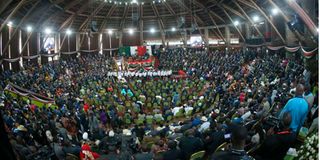Don’t be fooled; political violence is neither inevitable nor necessary

The launch of the Building Bridges Initiative (BBI) report at the Bomas of Kenya in Nairobi on October 26, 2020. Eric Ng’eno writes that BBI is a National Accord in anticipation of violence because without violence, it is a solution to a non-existent problem.
What you need to know:
- There are several threats to democracy, good governance and stability inherent in the model of tribal consociation.
- The perilous politics of tribal consociation is a congenital feature of our political culture. Our leaders have been weaned on it.
Kenya’s second President Daniel arap Moi made a couple of observations that could have done with more analysis because generally speaking, he was bang on. The first was that Kanu would rule Kenya for 100 years. The second was that multiparty democracy would lead to ethnic bloodshed and even civil strife.
Nyayo – who has since died – made his predictions based on how political change would fare given a model he understood to be the norm.
The struggle for independence was fronted by arch-nationalists who were often devoted pan-Africanists and supporters of the global decolonisation movement.
However, with few exceptions, their role in the evolving republican enterprise back home also entailed championing narrower regional, often tribal interests.
Be it Kanu or Kadu, therefore, our political movements were tacitly consociational propositions held together by the delicate balance of fiercely competing ethnic sub-national claims. Such testy equilibria made governing ever more challenging, and democracy fraught.
The threat of defection conferred intra-party leverage, fuelled intense inter-party competition and conflict. The cannibalisation of Kadu and the impulse for one-party dominance are mere rational responses.
The reintroduction of multi-partyism promised to reset politics by abolishing tribal consociation and introducing liberal democracy. However, Kenya quickly defaulted into competition between ethnic factions and inter-tribal coalitions.
The Forum for the Restoration of Democracy (Ford), like the independence movement, was populated with Second Liberation icons who quickly turned into tribal chiefs. Ford's fission into numerous clamorous splinters ‘proved’ that ethnic consociation was a cardinal feature of our political culture.
Threats to democracy
Ever since, commentators and political actors smugly proclaim that Kenyan politics is inherently ethnic. This is only true in the sense that a strong tradition considers tribe to be the key unit, tribal chiefs the focal points of political mobilisation, and bargaining over slicing of the ‘national cake’ the objective of democratic activity.
This is “how things are done around here”; the only thing we know, received as the only way that works. Even the political aesthetic of ‘national outlook of ‘face of Kenya’ is understood as a requirement to accommodate significant tribal claims in order to secure legitimacy.
There are several threats to democracy, good governance and stability inherent in the model of tribal consociation. Tribal chiefs are swiftly intoxicated with the discretion and patronage they wield, both at the national negotiating table and sub-nationally, within their local networks.
Brinkmanship, retaliation and threats to defect are intrinsic to the framework, while (potential) violence is necessary to underscore the boundaries of (un)acceptable behaviour. The sort of non-stop surveillance entailed by such low-trust environment initiates aggravating feedback loops.
To appease tribal stakeholders and keep the pact intact, all state resources must be channelled through them. Productivity is replaced by opportunistic alignment with the dominant patronage networks.
Gross economic distortions arise as output increasingly represents entities that are parasitic on national budgets, the wealthiest people are politicians and civil servants, and the most profitable firms are owned by them.
Unsanctioned access to opportunity
The definition of corruption also mutates to imply unsanctioned access to opportunity by outsiders excluded from the patronage networks of consociating chiefs. Hence the grievous dissonance of the ‘war on corruption’.
The perilous politics of tribal consociation is a congenital feature of our political culture. Our leaders have been weaned on it.
The conditioning is complete, and the possibility of other approaches is absolutely foreclosed in their minds.
Unsettling disclosure
This is the complication Ruto’s bottom-up insurgency brings: it presents no opportunity whatsoever for the deployment of typical consociational strategies and instruments. It paralyses and overwhelms the big boys. The Building Bridges Initiative (BBI) only makes sense when examined through the lens of ethnic consociationalism. It was a charter to facilitate smoother arbitration of claims among ethnic kingpins.
The presidency is the general secretariat of tribal consociations, and chief executive of the ethnic patronage system. BBI was billed as the antidote for violence arising from explosive ethno-regional contests and grievances. Violence is implicitly foundational to the BBI. This is why BBI bore the strong flavour of a National Accord: a post-conflict settlement between ethnic elites. Except that there was no antecedent violence.
I speculated last week that the needful violence would be engineered to activate the BBI. Yesterday’s unsettling disclosure of resolute mobilisation in that direction settles the matter.
Violent conflict is instrumental in anchoring consociational settlements. BBI is, therefore, a National Accord in anticipation of violence. Without violence, BBI is a solution to a non-existent problem. That is why it must be engineered.
If by Kanu Nyayo meant ‘ethnic consociation’ and its distortionary impact on the political economy, he was prescient.
The abortion of Kenya’s three liberations – of 1964, 1992 and 2010 – is directly attributable to these Kanu-esque political reflexes.
The only way to defuse the violent potentiality of BBI-type arrangements is to shift political engagement to a less competitive and conflictual, more inclusive and collaborative transformational paradigm.
Nobody has any use for a framework embedded in violence: introduced through repression, sustained by the horrors of memory and the fear of the unknown.
The writer is an advocate of the High Court and a former State House speech writer. @EricNgeno





